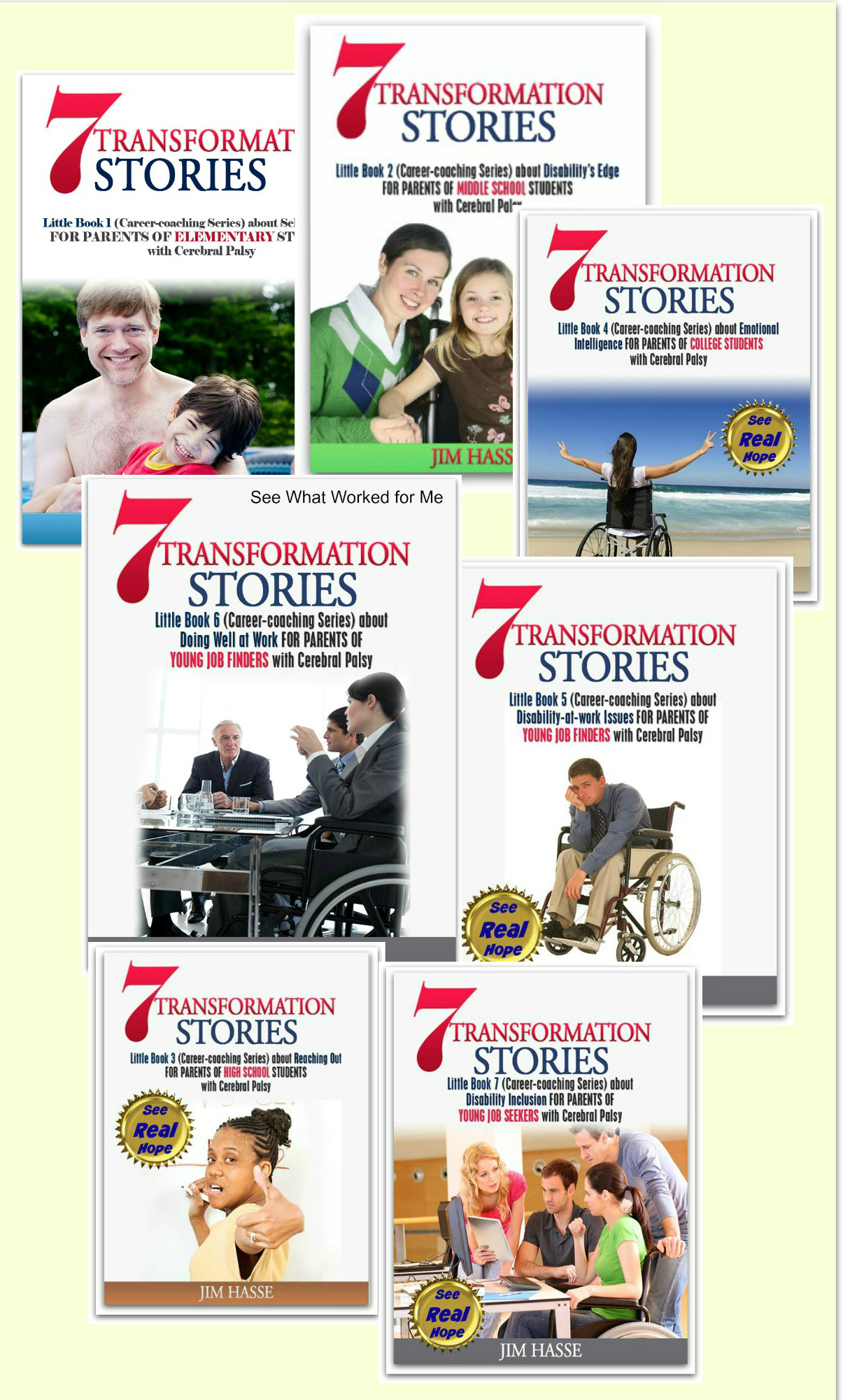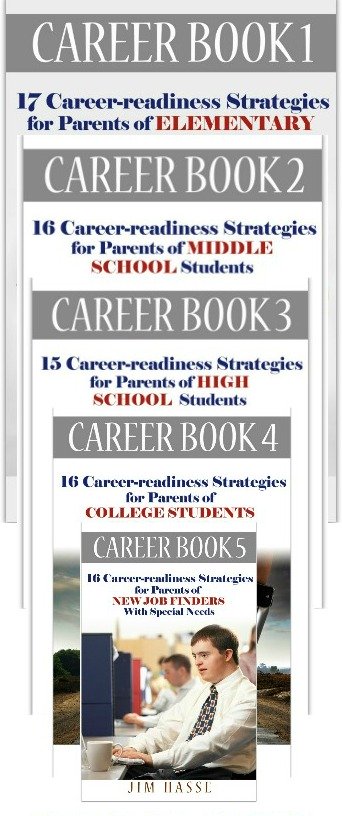Career Counselor: Cerebral Palsy
Career Builder for College
Students
By Jim Hasse, ABC, GCDF, Disability Employment Expert
_________________________________________________________
You are not your college student’s career counselor.
He or she happens to have cerebral palsy (CP), and you’re voluntarily giving your time as a mentor or advisor who is interested in exploring with him or her some of the deliberate steps which can help build a meaningful career.
In short, you’re a guide. As a guide, you may wish to help your college student find an effective career counselor.
And, during that process, you may want to remind your youngster that you have a unique role, using language such as this:
“Only you are in charge of your career. You are in an all-terrain vehicle, and you're in the driver's seat. You need to learn how to traverse today's job market on your own with feedback from me, as your mentor, and a qualified career counselor.”
That's the picture Richard N. Bolles is currently painting for today's job seekers. He's the author of "What Color Is Your Parachute?"
Bolles told an audience of career development professionals at the 25th Annual Careers Conference, held in Madison, Wisconsin in January 2011, that the qualities he seeks in someone who offers career guidance fall within a "practitioner" mode -- someone who "is fit to guide."
Bolles says a career practitioner specializes in finding tools and resources to help your college student choose the right career and make the best decisions about how to get the right job in the right field.
But, overall, a career practitioner’s goal, according to Bolles, is to help your college student make choices in terms of career, job and workplace so he or she feels that:
-
“What I do really matters.”
- “I’m fully tapping into my skills and attributes.”
- “I’m growing in my particular field of endeavor.”
In other words, a career practitioner helps an individual get on a career path that is right for him or her.
Throughout his career conference presentation, Bolles gave me ideas for choosing a career practitioner, criteria I wish I had in 1993 when I first sought career counseling.
Here's what I gleaned from his remarks.
A career practitioner needs to be someone who:
-
Asks "what" -- but never
"why" questions -- and asks your college student to give supporting
evidence for your claims about skills, attributes, interests etc.
- Asks "how,"
"when" and "who" to help your college student identify personal
behaviors, breaking the process of self-examination down into small steps.
- Gives your college student homework
and requires effort on his or her part as a “buy-in” into the process of
self-examination and personal decision making because each individual, without
knowing it, has most of the answers about how to build a career and, as a
result, need to do most of the exploratory work involved.
- Collaborates with your college
student in a personal dialogue (whether it be in person, via Skype or in real
time chat) and figuratively sits in front of a mirror with your student to find
who he or she is and can become -- a process which can help uncover hidden barriers
and how to you can work around them.
- Gives your college student information
about career options -- not what he or she personally needs as a counselor to
further his or her own career.
- Allows your college student to make personal
decisions and come up with leads for particular jobs.
- Walks your college student through
the process of career development and job seeking.
- Knows how to challenge your college
student as well as hold his or her hand while working through that career
development process.
- Encourages your college student to
work with two or three peers in challenging one another to find their paths to
meaningful careers.
- Is familiar with your college student’s field of study and is knowledgeable about the options available in the job market for his or her particular set of disciplines.
Beyond Bolles' 10 criteria, I'd recommend clarifying, in your mind, the options your college student has in choosing a career practitioner.
There are at least three types of career practitioners to consider, and let's take a brief look at each. The three types are:
-
Global Career Development
Facilitator (GCDF).
- Career Counselor.
- Vocational Rehabilitation Counselor (VRC)

Global Career Development
Facilitator (GCDF)
One of the more common places you'll find GCDFs in the U.S. is at Career One Stop Centers, which are sponsored by the U.S. Department of Labor. The GCDFs at centers like these mainly work with people who are making career transitions.
GCDF training is built around 12 core competencies identified by career counseling experts. A period of supervised career facilitation practice also is required prior to certification. The 12 competency areas addressed in GCDF training are these: helping skills, labor market resources, assessment, diversity, ethics, career development models, employability skills, training practices, program management, public relations, technology, and supervision.
The GCDF certification is managed by the Center for Credentialing & Education, which requires continuing education for GCDFs beyond the initial certification process.
GCDFs must have a bachelor's degree but are not career counselors. I have been a GCDF since 1995.
Career Counselor
Unlike GCDFs, career counselors are required to have a master's degree in counseling. They must demonstrate the knowledge and skills (which are similar to the GCDF competencies) for a specialty in career counseling that a generalist counselor might not possess.
After conducting a thorough evaluation of your college student’s personality traits, counselors must use their expertise to help your youngster assess skills and identify careers where those skills may be most profitably employed, both financially and in terms of job satisfaction.
Counselors are responsible for knowing what skills are needed in a broad variety of professions, how much they pay, and what a hiring authority will want to see in a successful applicant.
They then coach your college student through the process of researching fields that match his or her interests, setting up informational interviews with people to supplement company research, and finally targeting or creating specific job positions that meet your college student’s needs.
They can be employed by a secondary school or college or work as independent consultants or in job placement firms.
Vocational Rehabilitation Counselor (VRC)
Vocational rehabilitation counseling is focused on helping people who have disabilities achieve their personal, career, and independent living goals through a counseling process.
Before deciding whether to work with a vocational rehabilitation counselor (VRC) or a mainstream career counselor, your college student may find it helpful to answer these questions:
-
Do I need special consideration of my CP in determining
a career path?
- Do I need to learn more about how assistive
technologies might be used in certain job settings?
- Am I worried that the career center on campus may not
know how to assess the impact of my CP on my career choices?
- Am I concerned that a VRC may pigeonhole me into ‘typical’
disability jobs?
- Will I need training customized for my CP in order to
find or qualify for a position in my chosen career field?
- Might I need an advocate to stand behind me when talking to potential employers?
No matter how your college student answers any of these questions, choosing or not choosing a VRC can be valid because just the awareness of these concerns or possibilities can prepare your young man or woman to ask the career practitioner how these questions would be addressed.
The only difference that should exist between a career counselor and a VRC is the number of specialized tools and the amount of information they have for accommodating CP as your college student makes career decisions.
But, remember, a VRC is empowered to choose the level of accommodation expenditures on a case-by-case basis.
And a VRC will provide one service that other career professionals do not offer: information about, training with and (sometimes) funding for assistive technology.
Remember: All three of these practitioners, not just a career counselor, require official accreditation. They are not to be confused with life coaches, business coaches, or executive coaches, who may not be trained or certified as career practitioners.
Overall, the secret to a great experience with a career practitioner boils down to examining the individual's credentials and approach, being clear about your college student’s own goals, and working diligently under that person's guidance.
When your college student is willing to take responsibility for his or her career path and you both have reviewed the guideposts in this article, it’s time to choose a career professional (a GCDF, career counselor or VRC) who is trained to help individuals make sound decisions which will lead to meaningful work.
Return from Career Counselor to Interview Tips
Go to Cerebral Palsy Career Builders
This is Creative Commons content. You can freely and legally use, share and repurpose it for non-commercial purposes only, provided you attach this sentence and the following attribution to it (including the two links):
Originally written and illustrated by Jim Hasse, ABC, GCDF, owner of Hasse Communication Counseling, LLC, who, as a person with cerebral palsy, served for 10 years as a vice president in a Fortune 500 company during his 29-year career in corporate communication. He’s an Accredited Business Communicator, certified as a Global Career Development Facilitator and author of 14 Amazon books about disability awareness and disability employment issues.





